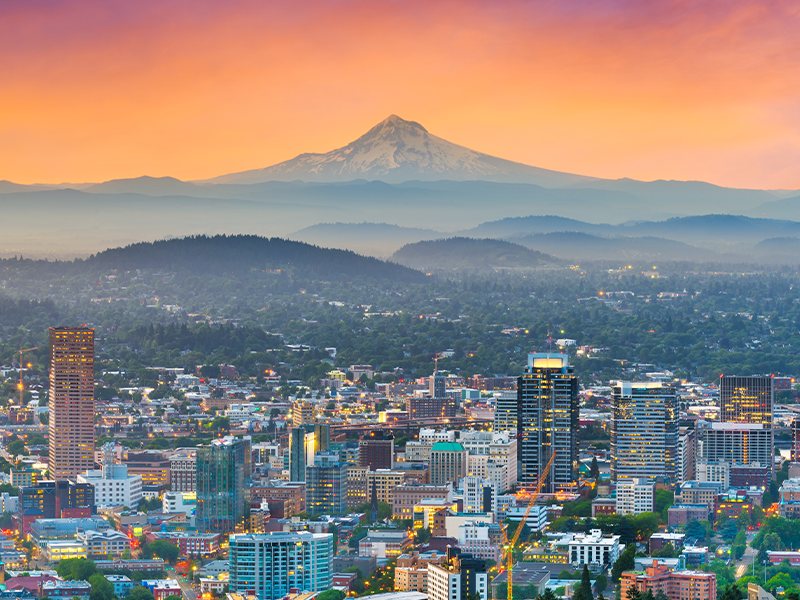Oregon Airbnb Laws and Regulations Across the State
Oregon has seen a huge increase of approximately 6,500 short-term rental units since March 2021. With the growing rate of vacation rentals in the state, cities recognize the importance of Oregon Airbnb laws in maintaining the state’s livability.STR laws and regulations are constantly changing, and we strive to keep our community up to date on these matters. Read below for details about short-term rental laws in Oregon.
If you have questions about short-term rentals in Oregon, contact Proper Insurance. Our agents are experts in the vacation rental industry. Call 888-631-6680 today.

Eugene, Oregon, STR Regulations
Airbnb Laws in Eugene, OR, Adopted in 2020
The City Council of Eugene, OR, adopted short-term rental registration rules through Ord. No. 20638 and requires all STRs within city limits to register annually.
The current short-term rental registration requirements include:
- Licensing & Registration: Eugene STRs must register every year with the City of Eugene. Registration is completed online and there is no registration fee.
- The online registration asks for the owner/operator’s name and contact, property street address, whether the unit is owner-occupied, unit count, and a local contact person (name, phone, email) for complaints.
- Occupancy Limits: Eugene’s occupancy limits is consistent with local zoning/occupancy rules, permitting up to 5 unrelated guests for overnight, paid stays for many single-family properties. Hosts should confirm limits for their specific property type with the Planning office.
- Taxes (TLT): Operators must collect and remit the City of Eugene Transient Lodging Tax (TLT) — 4.5% on short overnight stays; see the City of Eugene’s TLT guidance for filing and remittance rules.
- Safety & Compliance: Habitability and safety issues are enforced under Eugene’s Rental Housing Code, so hosts must meet general safety standards even if the STR registration itself doesn’t request proof of insurance or inspections. Contact Planning and Development for property-specific requirements.
- Enforcement & penalties: Registration is required by code (failure to register or falsifying registration information can lead to enforcement action.
- More Information: View the Short-Term Rental Rules PDF or Eugene’s STR FAQ guide.
Lincoln, Oregon, Short-Term Rental Rules
Lincoln, OR, Airbnb Laws Include Current Ban on Licensing
As of December 2024, the Board of Commissioners for Lincoln County, Oregon adopted a new regulation that extends the suspension of short-term rental licenses until March 31, 2025. September 6th, 2022. This is in hopes of better protecting the livability of neighborhoods where rentals are located.
Receive Regulations Updates
Join thousands of short-term rental professionals staying informed on emerging trends, real rental risks, and regulatory changes.
It’s once a month and only takes minutes to read.
"*" indicates required fields
Newport, Oregon, Vacation Rental Laws
Newport Airbnb Laws Include Waitlists
In June 2021 the Newport City Council approved Resolution No. 2021-62 which terminated the local emergency ordinance in place, which placed a moratorium on the issuance of new short-term rental permits. Newport currently has a waitlist open for short-term rental permits. Here are the requirements for joining the waitlist:
- The property to be permitted is located in a residential district and zoned for short-term lodging;
- You are the legal owner of the property. You are not eligible if you do not hold title and/or are in escrow;
- The property is not part of a Homeowners Association whose CC&Rs prohibit short-term lodging; and
- A short-term lodging permit for this property had not previously been revoked.
Apply to get on the waitlist today!
Portland, Oregon, Airbnb Regulations
Understand Current Short-Term Rental Laws in Portal
Portland regulates short-term rentals as Accessory Short-Term Rentals (ASTRs) under City Code 33.207. ASTRs are only permitted where the dwelling is the host’s primary residence, and they are limited to renting bedrooms rather than entire homes. Regulations are administered by the Bureau of Development Services (BDS) and Portland Permitting & Development (PPD).
- Licensing & Primary Residency: All Portland STR operators must obtain an ASTR permit. Permits are valid for two years and must be renewed. The host must live in the dwelling for at least 270 days per year; they may be away for up to 95 days per year.
- Permit Types: Steps for getting a permit for Portland Airbnb hosting are detailed in the Before You Apply guide, with separate instructions for Type A and Type B permits.
- Type A Permit (1–2 bedrooms): For smaller short-term rental properties, Portland offers the Type A permit. This option allows hosts to rent up to two bedrooms, with no more than five overnight guests at one time. Type A permits require hosts to notify their neighborhood association and adjacent property owners, creating transparency with the surrounding community. Bedrooms must have interconnected smoke and carbon monoxide alarms on each floor where sleeping areas are located.
- Type B Conditional Use (3–5 bedrooms): Larger-sized Portland vacation rental properties with 3 to 5 bedrooms fall under the Type B conditional use category. A Type B permit requires a Conditional Use Review, where city officials evaluate the impact of the rental on the surrounding area. The same residency and safety standards as Type A apply, but zoning restrictions are stricter: Type B ASTRs are only allowed in residential zones and are prohibited in commercial, mixed-use, and industrial areas.
- Zoning: ASTRs are permitted only in residential zones. Whole-home rentals without residency are not allowed under ASTR rules and instead fall under classifications for hotels or transient lodging.
- Occupancy: Guest limits depend on permit type. Type A permits cap occupancy at five overnight guests across one or two bedrooms. For Type B permits, guest capacity is determined during the Conditional Use Review, typically calculated at two guests per bedroom.
- Taxes: Hosts must register as a business with the City of Portland Revenue Division. Portland STR hosts are responsible for collecting and remitting the City of Portland Transient Lodging Tax, the Multnomah County Lodging Tax, and the Oregon State Lodging Tax.
- Parties & Events: STRs may not be used for commercial events such as weddings, parties, or receptions.
- Safety & Compliance: All STR properties must meet basic safety requirements, including working smoke detectors and carbon monoxide alarms. Bedrooms must be legally recognized sleeping rooms. Hosts are required to keep a guest log with names, dates, and contact information, available for City inspection if requested. All online listings and advertisements must also display the valid ASTR permit number.
- Enforcement & Fines: Violations of Portland’s ASTR rules carry steep financial penalties. Fines start at $1,451 for the first violation, increase to $4,345 for the second, and reach $7,239 for subsequent violations, up to a maximum of $27,513 per case. In more serious cases, permits can be revoked entirely. If a permit is revoked, the unit is barred from reapplying for a Type A permit for two years. More details on penalties are outlined on the Maintain ASTR Permits & Conditional Uses page.
- More Information: For a complete view of Portland’s regulations, hosts can reference City Code 33.207, which establishes the framework for ASTRs. Ongoing compliance standards are outlined by Portland Permitting & Development. Business registration and lodging tax obligations for Portland Airbnb hosts are managed through the City of Portland Revenue Division. Together, these resources provide the full picture of what it takes to operate a short-term rental legally in Portland.
Within the updated Oregon Airbnb Laws for Portland are residency requirements for short-term rental permits. The resident of the vacation rental must occupy the unit for at least 270 days during each year, but there are no limits to the number of nights you may have a short-term rental.
The Dalles, Oregon, Airbnb Laws
Updated Airbnb Rules & STR Regulations for The Dalles
The city of The Dalles has implemented short-term rental regulations to comply with local, state, and federal laws while mitigating negative neighborhood impacts. These rules aim to ensure a safe, well-maintained, and community-friendly environment by providing clear standards for property owners and operators.
- Moratorium on STR Licenses: No new licenses for non-owner-occupied STRs in residential zones will be issued during the moratorium unless modified or repealed by the City Council. STR operators with valid, grandfathered licenses and in good standing can reapply to continue operations.
- Licensing: All short-term rental owners and operators (including bed-and-breakfasts) must obtain an annual, non-transferable $90 license that is valid from January 1 to December 31. Licenses are void upon property transfer; new operators must apply for a new license. Applications require current contact information and adherence to operating standards.
- Transient Room Tax Compliance: Per Chapter 8.04, STR operators must submit proof of the past year’s Transient Room Tax payment as part of the annual license renewal process. Failure to provide this proof will result in license denial.
- Good Neighbor Guidelines: Mandates acknowledgment and distribution of neighborhood respect guidelines to all STR guests.
- General Requirements: Weekly waste disposal is mandatory, and operators must provide proof of garbage service. Properties must comply with all City Codes regarding noise, smoke, litter, and odor.
- Length of Stay: Guests may stay no longer than 30 consecutive days.
- Occupancy Restrictions: Guest limits are set at two people per bedroom. Occupancy limits must be clearly posted near the main entrance.
- Health and Food Services: Short-term rentals offering food services must secure a food service license from the Oregon Department of Human Services. If you provide liquor at your property, insurance professionals advise that you have liquor liability included in your policy.
- Special Events Disallowed: Special events such as weddings, corporate functions, or large gatherings, during transient rental periods, are not permitted.
- Safety Requirements: Short-term rental operators must complete a safety checklist before obtaining a license. Properties must have smoke detectors, fire alarms, and comply with all building safety codes.
- Parking: Off-street parking is required based on the number of guest rooms. Historic properties may apply for parking exemptions, subject to review and approval.
- Enforcement Policies & Appeals: Violations, such as operating without a license or breaching regulations, are fined up to $250 per infraction per day. Additional penalties include license revocation for recurrent violations or risks to public health and safety.
- More Info: Read more about The Dalles’ short-term rental laws.
Quote Your Short-Term Vacation Rental Today
Proper Insurance is the nation’s leading short-term vacation rental insurance provider, with the most comprehensive policy on the market. We protect homes in all 50 states with unmatched coverage for your property, revenue, and business liability, customized to include guest-caused theft/damage, liquor liability, amenity liability (bikes, kayaks, hot tubs, etc.), bed bugs, squatters, and more.
Please note: The information provided is intended as a guide and may not be comprehensive or current. Regulations may change and could vary by area or situation. Always consult local authorities or a legal professional to ensure you have the most accurate information for your short-term rental property.
Get the Updates You Need
Stay informed on regulatory changes, STR trends, and real short-term rental risks with our newsletter.
It’s once a month and only takes minutes to read.
"*" indicates required fields




